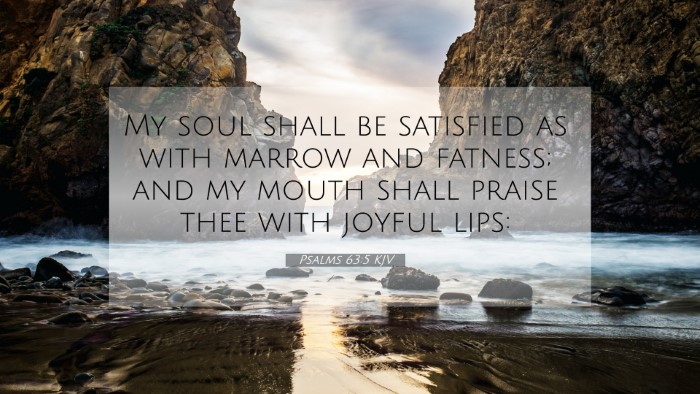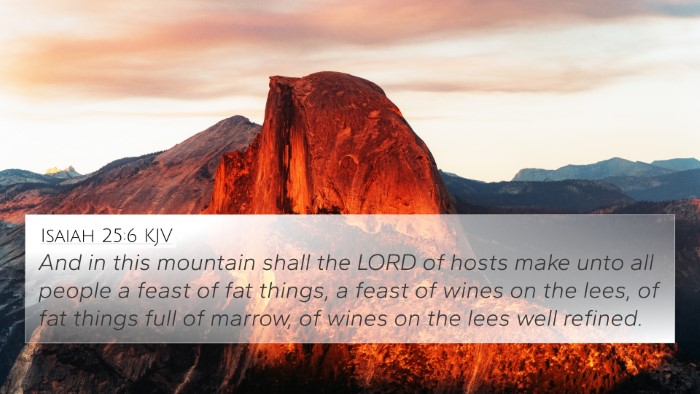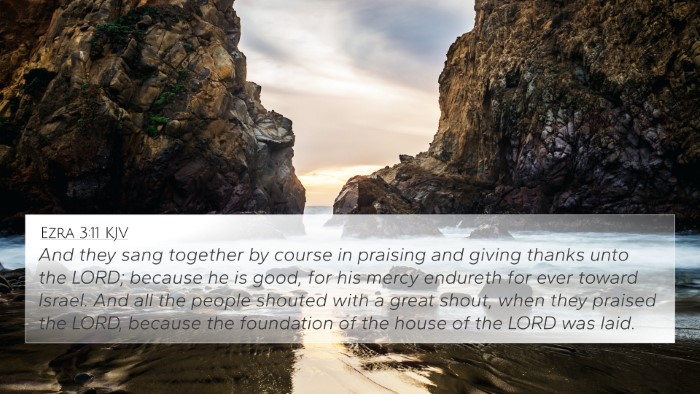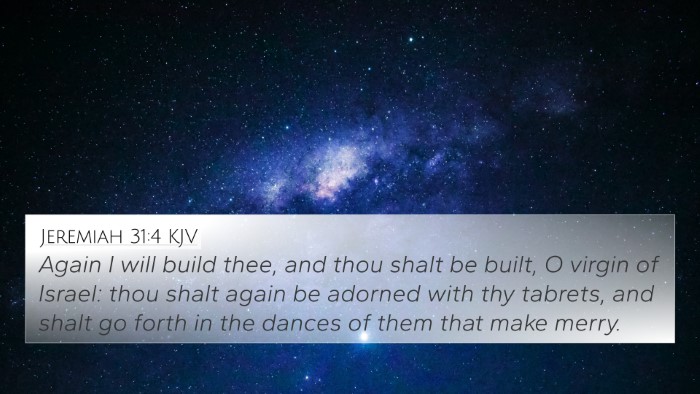Understanding Psalms 63:5
Psalms 63:5 states: "My soul shall be satisfied as with marrow and fatness; and my mouth shall praise thee with joyful lips." This verse holds profound meaning in its expression of spiritual nourishment and worship. Below, we explore the insights from public domain commentaries, providing interpretations and contextual understanding of this impactful scripture.
Main Themes
- Spiritual Satisfaction: The verse emphasizes how deeply satisfying the presence of God can be to the believer's soul.
- Worship and Praise: It links physical contentment with an outpouring of praise, highlighting the importance of expressing gratitude.
- Comparative Imagery: The use of "marrow and fatness" symbolizes richness and abundance, providing an analogy for spiritual fulfillment.
Commentary Insights
Matthew Henry emphasizes the connection between physical and spiritual satisfaction. He explains that just as marrow and fat are seen as the richest parts of the body, the satisfaction that comes from God's presence is the most nourishing for the soul. According to Henry, true contentment is derived from God, and one must turn to Him for ultimate joy and fulfillment.
Albert Barnes discusses the imagery of "marrow and fatness," noting that it refers to the richest food that a person can consume. This language depicts a state of abundance and completeness that believers find in their relationship with God. He notes that when a believer experiences this satisfaction, it naturally leads to heartfelt praise and worship as a response of joy.
Adam Clarke highlights the expression of praise with "joyful lips," which signifies that such fulfillment not only satisfies the soul but also overflows into joyful expression. He emphasizes the necessity of praise as a response to the divine sustenance received, linking it to the believer's prayer life and daily worship.
Bible Verse Cross-References
- Psalm 107:9: "For he satisfieth the longing soul, and filleth the hungry soul with goodness."
- Isaiah 55:2: "Wherefore do ye spend money for that which is not bread? and your labour for that which satisfieth not?"
- John 4:14: "But whosoever drinketh of the water that I shall give him shall never thirst; but the water that I shall give him shall be in him a well of water springing up into everlasting life."
- Matthew 5:6: "Blessed are they which do hunger and thirst after righteousness: for they shall be filled."
- Psalm 36:8: "They shall be abundantly satisfied with the fatness of thy house; and thou shalt make them drink of the river of thy pleasures."
- Philippians 4:19: "But my God shall supply all your need according to his riches in glory by Christ Jesus."
- John 6:35: "And Jesus said unto them, I am the bread of life: he that cometh to me shall never hunger; and he that believeth on me shall never thirst."
- Psalms 17:15: "As for me, I will behold thy face in righteousness: I shall be satisfied, when I awake, with thy likeness."
- Revelation 7:16-17: "They shall hunger no more, neither thirst any more; neither shall the sun light on them, nor any heat... for the Lamb which is in the midst of the throne shall feed them."
- Psalm 34:8: "O taste and see that the Lord is good: blessed is the man that trusteth in him."
Tools for Bible Cross-Referencing
Cross-referencing is an essential method for exploring the connections between Bible verses. Here are some tools and resources that can deepen your study:
- Bible Concordance: A comprehensive index that helps in locating specific words and phrases across the scripture.
- Cross-Reference Bible Study: Guides that help users find related scriptures and understand their interconnections.
- Bible Cross-Reference System: Systems that categorize verses thematically or conceptually for easier navigation.
- Bible Reference Resources: Various books and online databases that provide cross-reference material for both study and sermon preparation.
Insights on Inter-Biblical Dialogue
Understanding Psalms 63:5 enriches our view of how verses interact and speak to each other across the canonical texts. The thematic parallels highlight how both Old and New Testament scriptures continually affirm God's promise of satisfaction and fulfillment, emphasizing that God's provisions are a recurring theme in the believer's journey.
Conclusion
In Psalms 63:5, we find profound spiritual nourishment that invites us into a deeper relationship with God. As we explore cross-references and thematic connections, we see the consistency of scripture in revealing God's satisfying presence to His people. The interconnectedness of these verses provides a holistic view of God's promise to satisfy and nurture the soul, ultimately leading to a life of continual praise.
















